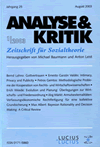Suchergebnisse
"Simon Hailwood"
Titel: Political Reasonableness and Nature’s Otherness
Autor: Simon Hailwood
Seite: 173-189
Abstract: This paper restates my argument that certain forms of liberalism can and should accept a non-instrumental perspective on the natural world. This perspective is unpacked in terms of ’respect for nature’s otherness’. Liberalism is represented by Rawlsian political liberalism. I claim there are important congruencies between respect for nature’s otherness and the ’reasonableness’ involved in political liberalism, such that the latter should incorporate the former. Following a suggestion of B. Baxter I reconsider these congruencies with particular emphasis on the roles of toleration and integrity. I also explain further why I think it arbitrary, rather than logically inconsistent, of the political liberal to exclude respect for nature’s otherness from her conception of the political. Finally I argue that insofar as liberalism embraces ecological justice on the basis of the considerability of non-human interests, it cannot consistently exclude respect for nature’s otherness.
Titel: Political Liberalism, the Non-Human Biotic and the Abiotic: A Response to Simon Hailwood
Autor: Brian Baxter
Seite: 190-205
Abstract: S. Hailwood argues that if political liberals, in the Rawlsian sense, refuse to grant non-human nature anything other than instrumental value, then they may properly be characterised as human chauvinists, but not as inconsistent political liberals. He also argues that political liberals who do grant non-instrumental value to the non-human are thereby committed to a form of moral valuation of the abiotic. However, an analysis of what is involved in regarding non-human biota as possessing instrumental value reveals that humans must recognise the existence of interests, needs and desires of those non-human organisms which they wish to treat instrumentally. Given this, political liberalism in its most persuasive form, as articulated by Barry, implies that political liberals are not permitted to decide arbitrarily that non-human biota have only instrumental value. But the crucial role of interests in this argument precludes the attribution of any form of moral value to the abiotic.

Ecological Goals and Liberal Ideals: Harmony or Conflict?
2006 (28) Heft 2
Guest-Editor: Thomas Schramme
Editorial
Liberty, equality, justice and solidarity are traditional political ideals of modern Western democracies. Different traditions and parties have supported different models in order to harmonise them. In contrast to the prevalence and long history of these values, ecological goals and needs have moved onto the political agenda fairly recently. Hence it should not come as a surprise that there is no consensus about the compatibility of ecological ambitions with common Western political ideals. Righ...